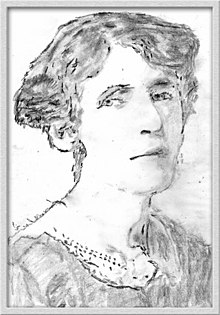Rose Macaulay
English novelist and writer (1881–1958)
Emilie Rose Macaulay (1 August 1881 – 30 October 1958) was an English novelist.

| This article on an author is a stub. You can help out with Wikiquote by expanding it! |
Quotes
edit- Jane: What do you think of his book Arthur?
Gideon: I don't think of it. I've had no reason to, particularly. I've not had to review it. ...I'm afraid I'm hopeless about novels just now, that's the fact. I'm sick of the form—slices of life served up cold in three hundred pages. Oh, it's very nice; it makes nice reading for people. But what's the use? Except, of course, to kill time for those who prefer it dead. But as things in themselves, as art, they've been ruined by excess. My critical sense is blunted just now. I can hardly feel the difference, though I can see it, between a good novel and a bad one. I couldn't write one, good or bad, to save my life, I know that. And I've got to the stage when I wish other people wouldn't. I wish everyone would shut up, so that we could hear ourselves think...- Potterism (1921) p.196.
- To the politician we are something of a dark horse. He does not know what we want; he wishes he did. Do we know ourselves? Vaguely we know that we don't want the politician.
- A Casual Commentary (1925), quoted in Murphy, Edward F. Webster's Treasury of Relevant Quotations , Greenwich House, New York, 1983 (pg. 483).
- Once learnt, this business of cooking was to prove an ever growing burden. It scarcely bears thinking about, the time and labour that man and womankind has devoted to the preparation of dishes that are to melt and vanish in a moment like smoke or a dream, like a shadow, and as a post that hastes by, and the air closes behind them, and afterwards no sign of where they went is to be found.
- Personal Pleasures (1935), quoted in Murphy, Edward F. Webster's Treasury of Relevant Quotations , Greenwich House, New York, 1983 (pg. 185).
- The trouble about the fashions is, there are too many going on at once, and you can't follow them all. Sometimes, I think I will give them all up, and just be dowdy.
- Personal Pleasures (1935), quoted in Murphy, Edward F. Webster's Treasury of Relevant Quotations , Greenwich House, New York, 1983 (pg. 247).
- How fast and how loud foreigners talk ! It is a gift ; the British cannot talk so loud or so fast. They have too many centuries of fog in their throats.
- Personal Pleasures (1935), quoted in Murphy, Edward F. Webster's Treasury of Relevant Quotations , Greenwich House, New York, 1983 (pg. 276).
- "Take my camel, dear," said my aunt Dot, as she climbed down from this animal on her return from High Mass.
- The Towers of Trebizond (1956), opening words
- Poem me no poems.
- Quoted in Poetry Review, Autumn 1963
- Cranks live by theory, not by pure desire. They want votes, peace, nuts, liberty and spinning-looms not because they love these things, as a child loves jam, but because they think they ought to have them. That is one element which makes the crank. Another is lack of proportion, the obsession with one desire or one principle to the minimising or exclusion of others; exaggeration, in fact.
- "Cranks", Woman's Suffrage: The Common Cause of Humanity, vol. 10, p. 132, June 28, 1918.
Quotes about Rose Macaulay
edit- The best book she has written, and that is saying a lot.
- John Betjeman, review of The Towers of Trebizond in The Daily Telegraph (1956), quoted in J. V. Guerinot, 'Rose Macaulay', in Thomas F. Staley (ed.), British Novelists, 1890–1929: Modernists (1985), p. 152
- Rose Macaulay is a wise guide, tolerant, generous-minded, liberal, courageous, cheerful, and her judgments of society and social values are always sound.
- E. M. Forster, "English Prose between 1918 and 1939", in Two Cheers for Democracy. Edwin Arnold, London, 1951.